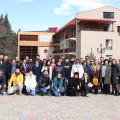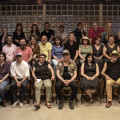Do you consider the First Artsakh War to be sufficiently reflected in our literature? To what extent does the young generation know about this war and our victory?
Several pieces have been written. But almost all of them have a patriotic tone, which is not bad but places limits on the boundaries of literature on the war.
Your generation bore witness to a war, victory, then another war, and defeat. How will all this be reflected in our literature, in your opinion, so that they can present the complete picture of these times in which we are living?
It would be good to see literature take a critical attitude to war and, from this position, to highlight issues on the value of human life, citizenship, the localization of universal human values and closer integration with the rest of the world. It should give meaning to the achievement of statehood rather than the define patriotism from the point of view of land or a nation. It should focus on human beings and the establishment of a state that facilitates the fulfilment of their potential to create. What have wars given us when it comes to development and the possibility to live in security and harmony with the rest of the world? This is the main question that literature should critique and this should create a new discourse. Otherwise, everyone is stuck in this discourse of Soviet nationalism and patriotism that comes from the 1960s and, to be honest, it’s not enough that this is disgusting and tiring, it is also leading to the proliferation in the new generation of stereotypes that come from the past and can only lead to a dead end.
What myths did this recent Artsakh War destroy for you as a writer?
I’m not a writer, but I can say that the fruitless discourse of the Armenian Question has been placed in doubt now, at the very least, and the idea that we need to develop and create a prosperous and secure state is growing in popularity.
How can the war be reflected in our literature?
It would be good to see the issues of war and peace raised in literature, so that it can counterbalance the ideas of national discourse coming from Soviet times, which create fertile soil for Russia’s colonialist ambitions.
The third article of the PEN Charter mentions peace, good understanding between nations, and respect. How realistic is this after the war?
It might become realistic if these issues are also presented from the point of view of literature.
Before the Second Artsakh War, there were mutual visits and some contact at the level of non-governmental organizations and people-to-people diplomacy between Armenians and Azerbaijanis as well as Armenians and Turks. In your opinion, why was none of this able to plant the seeds of tolerance among the Turk and Azerbaijani people, why were they unable to reject this xenophobia?
Because both societies don’t have that group of people that promote peace or that spread the discourse of peace among the masses, attempting to make some of these topics acceptable through attractive literature and other means that are comprehensible to the public.
For many years, we have seen that Armenian and Azerbaijani or Armenian and Turk intellectuals and civil society actors have met and participated in various seminars both in Yerevan and Baku as well as in several corners of the world, with considerable grants spent on these events. Why was all of this unable to serve its purpose, globally speaking, of establishing peace and reconciliation, and why did the Second Artsakh War take place?
The reason is the same as the one I mentioned in my response to the previous question. In addition, our literature has been unable to create channels of mutual recognition. There are a very few stories that talk about the simple human joys of Azerbaijani characters in Armenian literature and of Armenian characters in Azerbaijani literature. To put it simply, literature must counterbalance the spread and reinforcement of nationalism in political circles, but it has not done so.
Many years ago, in 2002, when Hrant Matevosyan was asked about what he would say to those going to the frontlines if a war broke out the next day, he replied, “I would say, Victory and nothing else. Defeat is an old hag that clings to your back…’” What thoughts have come to the fore after the Second Artsakh War and our defeat that followed?
I think that literature should give new meaning to history and should rescue it from nationalistic discourse. Literature must give birth to a new discourse, which will shape the idea of development in our people and the objective to make our future safe through that development. It would also be good if literature were to move beyond the narrow limits of nationalism and to speak about issues and ideas that concern the world overall, placing Armenia and the people that live in this country within the context of these larger problems.
The three former presidents of Armenia attempted to launch relations with Turkey. Why did Turkey not adopt a neutral stance during the Second Artsakh War?
Because Turkey has become an extremist nationalist state and this is becoming even more prominent with every additional day of Erdogan’s regime.
So how can we establish good neighborly relations with Azerbaijan if they don’t return our compatriots that they hold prisoner?
That is impossible at this moment. Good neighborly relations must come about through mutual effort. It is not necessary for literature to artificially preach such relations. It can have the role of critiquing the things that hamper the development of such relations. And that includes the topic of prisoners.
Can a writer’s words and text play a role in peacebuilding initiatives and succeed? Will these words be understood and accepted?
If the writer is a good one, then yes. One should be able to penetrate into the reader’s soul rather than their stereotypes of national belonging.
As an intellectual, how do you see your own mission when it comes to fostering reconciliation between these peoples and the establishment of good relations with neighbors?
I don’t want to take on such a mission myself. The main thing that I do is to spread thoughts and words that go beyond our national insecurities. This includes talking about human-centered values and spreading attitudes along the same vein, through my own life and words. The thing is that we need to change our society and make it more human-centered, with equal rights for everyone.
What role can a writer’s words and text play today in reconciling the peoples, or in peacebuilding initiatives?
It does not play much of a role these days, but if some good pieces of literature are written, they can be very well accepted in this context of post-war shock. Our society today needs new thoughts and ways out of this situation. But very few people are talking to it about such solutions.



